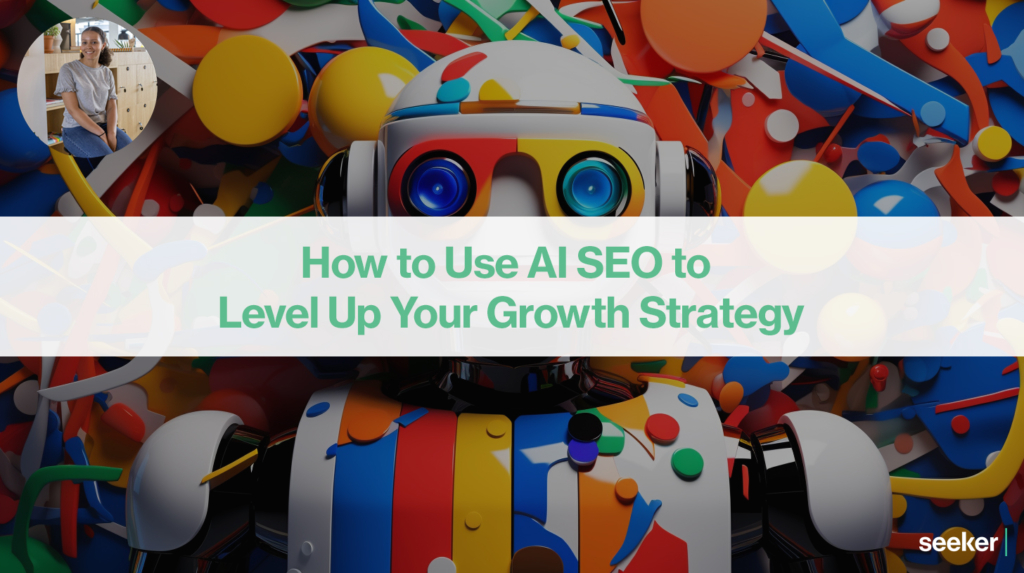
Just when you thought AI had reached its peak, AI SEO is quickly establishing itself as one of the most valuable SEO strategies for futureproofing your business. Although both AI and SEO are complex and multilayered disciplines on their own, used together they form a potent partnership, with the power to maximise your overall ranking potential.
If you need a little help navigating the somewhat new-fangled realm of AI SEO, this one’s for you! Our in-house AI whiz Alistair Clarke is here to guide you in the right direction when it comes to leveling up your SEO strategy with AI.
What is AI for SEO?
Just as AI has become so ingrained in our everyday lives — from facial recognition technology to digital voice assistants like Alexa — it is also becoming increasingly pivotal in SEO.
AI-powered SEO can be looked at in two ways; firstly, in terms of how AI can be used to improve the way you create your strategies, and secondly, the changes that AI is making to search engines through AI-powered algorithms.
Essentially, the way people search for things is changing, and it’s increasingly important to understand how AI impacts search engines to boost your SEO. Plus, if you’re looking to become more efficient in your work, AI tools can help you alleviate mundane tasks so you can maximise your productivity and creativity.
“The scope of AI-driven SEO is limitless. But people in the SEO industry should think about applications for three core actions — developing search engines, using search engines, and finding ways to impress search engines. SEO is primarily concerned with that last action. Almost everything we do is about impressing search engines to improve rankings so most of our AI-related concerns will go towards replicating or improving associated tasks like finding keywords, optimising content, and identifying linking opportunities.”
– Alistair Clarke
Since search engines are changing the type of content and trust signals they favour, it’s essential that the type of SEO you’re doing is set to impress — that’s where AI can help. But, we can’t forget about the other actions (developing search engines and user behaviour), as AI is already shifting the search landscape considerably.
How will AI change search engines?
The role of AI in search goes beyond replacement; it’s about evolution and augmentation. Modern search engines already integrate AI and ML technologies to enhance search result relevance and accuracy. Take Google’s algorithm, for instance, which employs RankBrain, an AI system, to gain a deeper understanding of users’ search intent, especially for ambiguous or unique queries.
AI has also drastically enhanced the personalisation of search results. By analyzing past behaviours, click-through rates, and user interests, search engines can create a unique, personalized search experience for every user.
Generative AI like Bard, for example, allows search engines to understand the context and user intent behind queries, moving away from a purely keyword-based approach. Users will be able to search long-winded and detailed searches that may have been previously broken down into separate questions. Users will see suggested next steps, while product recommendations will be based on a more acute understanding of user behaviour.
Here are a few important factors to consider as search engines evolve through AI:
- Focus on creating high-value content for your audience. Don’t simply focus on keywords but the intent behind a searchers’ query, the most relevant answers you can provide, and what the next steps in their thought process might be.
- Adopt an informal, engaging tone. Google’s upcoming AI-powered feature known as search generative experience (SGE) aims to provide a more conversational search experience.
- Optimise product pages to capture tools such as Bard’s attention, aiming for feature-worthy appearances that improve engagement and increase conversions.
Will AI replace traditional SEO methods?
Inevitably, as technology advances, AI is poised to replace certain traditional SEO methods. AI is shaping the present and the future of SEO, after all, so to avoid getting left in the past, integrating AI solutions now will help you work smarter, not harder.
Let’s explore the ongoing transformation and its implications for the industry.
“Some areas I can see becoming fully automated are writing structured data and keyword research. Some people say there’s an art to it, or that it’s somewhat creative, but the process is actually very rigid and mechanical.”
– Alistair Clarke
Instead of speculating too much, it’s better to focus on what AI can do now as well as what it’s likely to affect in the immediate future. It’s always a good idea to keep up with technological developments and industry trends, of course, but try not to get too fixated on what else AI might do.
If the topic has got you thinking, take a look at our recent blog on the future of link building with AI integrations!
Getting started with AI in SEO
The truth is that there’s no need to panic. SEO never dies: it just morphs into new forms. Getting to grips with AI SEO will be yet another valuable skill to add to your business, and the best way to get started is to simply embrace it.
Your own experience of using the technology can dispel any worries or misconceptions you may have about AI, while helping you find unique solutions that enhance your SEO work.
Here are Alistair’s top tips for getting started with AI in SEO:
- Play around with ChatGPT as it’s free and convenient. There are plenty of Chrome extensions and apps built to use ChatGPT so you can find the best prompts for your needs.
- Ask ChatGPT what it can help you with. This can help you understand its strengths and weaknesses like its lack of access to recent data.
- Use Zapier to create new automation with ChatGPT, such as connecting your Google My Business account and having AI write optimised posts on your behalf to improve local SEO rankings.
- Critically analyse what you do as an SEO by considering what you’ve avoided doing and how AI could provide a solution.
- Don’t feel the need to implement AI on anything big. Start small and worry about the rest later.
How can AI be used to improve SEO strategies?
There are so many ways that AI can improve your SEO strategy. With AI now impacting search engines in the way search results are displayed and which ranking factors are most important, using AI in your own SEO work is the best way to optimise your website for an AI future.
Plus, let’s not forget about the practical benefits of AI. Not only can it accelerate long-winded tasks, but you can create more time to focus on the creative aspects that you really enjoy.
AI can improve your SEO strategies in the following ways:
- AI can take on mundane tasks that could otherwise take hours to complete manually. Why not use AI for keyword research? Remember, AI is great at working with large sets of data, so offloading this part of your strategy can help you work much quicker.
- Utilising AI means you can free up your time for more creative and strategic aspects of SEO, so you’re putting the most energy into your strongest areas.
- To continuously improve your SEO work, you need to experiment a little. AI can help you test and experiment with new areas that you’re not so confident in.
- During creative slumps, AI can assist in generating fresh ideas by offering unique perspectives to explore or creating novel connections you may not have previously considered.
- Enhancing your strategy can sometimes be challenging, but AI can offer tailored recommendations to help you identify opportunities for optimising your SEO efforts.
Did you know that AI can be used in link building? Check out Seeker Digital founder Gareth Simpson’s webinar on AI-enhanced Link Building to see how you can benefit!
Enhancing Content Creation with AI
Contrary to the misconception that AI will replace writers, it is proving to be a valuable tool in content creation. As a digital content writer, here’s how AI has become an asset in various aspects of my work:
- When tackling unfamiliar subjects, ChatGPT provides concise overviews and simple explanations. While it doesn’t instantly make me an expert, it equips me with a better grasp of a market or topic, which is a great starting point.
- AI is also very handy for constructing article frameworks, and once the structure is set, I can get on with writing!
- Optimisation is a huge part of any content strategy and AI can improve the way this is done, too. ChatGPT can evaluate your content and make recommendations to improve its ranking potential without affecting the readability of the piece.
Content should always be written for human first and AI algorithms second, so your expertise is still valuable in content creation!
“AI can help a lot with content optimisation if you’re trying to achieve specific targets. Tools like Surfer SEO can analyse content within a specific niche and identify the keywords you should target and in what quantity throughout your piece. The metrics aren’t flawless but they provide a solid depiction of where the content stands compared to comparable pieces.”
-Alistair Clarke
How about other types of content? It’s not just written content marketing that can be improved by AI, but also image and video creation. Take featured images, for example; using stock images is an easy solution, but they’re not unique, and finding exactly what you want can be difficult — that’s where AI can help.
You can use tools like Midjourney to create featured images that are unique and eye-catching; much like the header image of this article! Imagery is a simple but effective way of building engagement through your articles, and using AI can make the humdrum process of scrolling through stock images a lot more enjoyable.
Best Practices for Leveraging AI in SEO
Hopefully, by now, the thought of AI SEO is a little less daunting; so, if you’re ready to start experimenting it’s important to follow some best practices.
Here’s what Alistair suggests:
- Always monitor what AI produces. Despite the rapid evolution of AI, its functionalities are still being developed, which means not everything will work flawlessly. Review everything yourself. SEO still requires human input, so your oversight is essential.
- Experiment with AI. Don’t feel obligated to follow what others are doing. You may have a very versatile tool, but if what you’re attempting doesn’t align with your work, it’s not worthwhile. The most important thing is to discover how AI works for you. Feel free to experiment and explore different approaches. If it doesn’t work, don’t worry; simply try something else and continue refining it.
- Keep up with industry changes. AI will continue to evolve, so to ensure that you’re leveraging its full potential, it’s important to stay informed about new features and developments. If you’re using something like Zapier, for example, then keep an eye on its service update emails to discover new features that are coming out.
- Stay open minded. Instead of getting settled into a particular routine, be open minded in your approach to AI SEO. The technology has already changed so much over the past year, after all, so who knows how it could benefit you in 6 months’ time?
Amplify Your Growth with Seeker’s Expertise in Machine Learning
If you don’t want to get left behind, leverage AI SEO to level up your SEO strategy. And if you’re still ready to fully embrace the machine-led revolution, rest assured that the journey to an AI-assisted SEO strategy is not quite as treacherous as it may appear.
Let the experts at Seeker amplify your growth by leaning into machine learning. Get in touch with us today to find out more.
